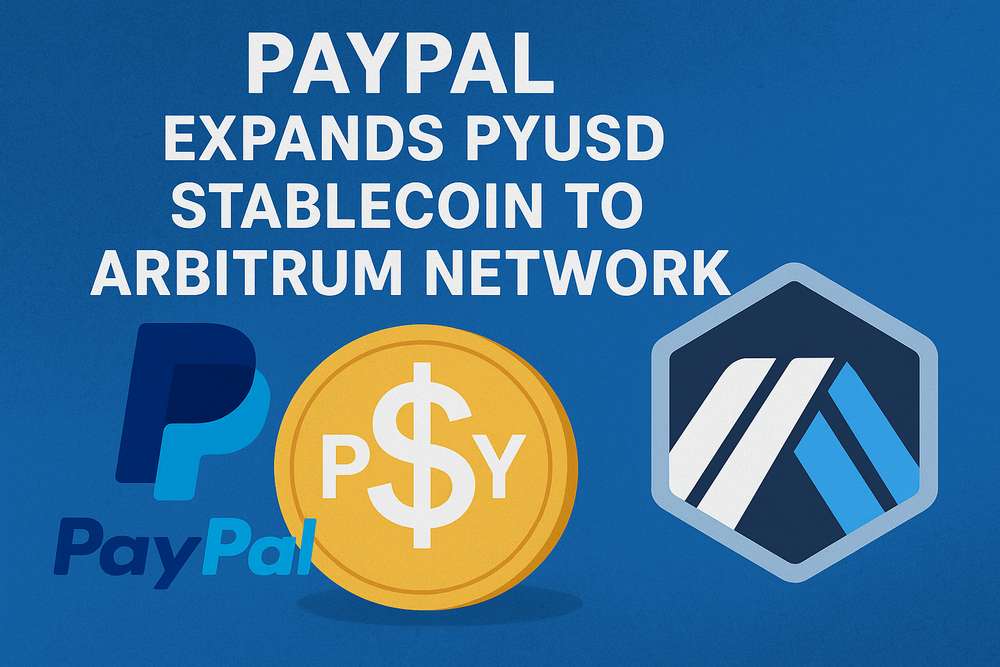
PayPal has expanded its dollar-pegged stablecoin PYUSD to the Arbitrum community, marking a strategic transfer to reinforce cross-chain utility and scale back transaction prices. The replace appeared in PayPal’s revised phrases of service on July 16, 2025, including Arbitrum alongside current Ethereum and Solana help. This integration positions PYUSD to leverage Arbitrum’s high-throughput infrastructure for sooner settlements and decrease charges.
The enlargement occurred with out formal announcement, revealed by way of up to date coverage language specifying Paxos because the issuer throughout all three networks. Transaction limits for Arbitrum have been uniquely outlined, indicating tailor-made liquidity administration for the Layer 2 atmosphere. PYUSD’s market capitalization at the moment stands at roughly $844 million, having briefly surpassed $1 billion in June earlier than receding.
This deployment follows PayPal’s sample of blockchain diversification, having prolonged PYUSD to Solana in 2024 after its 2023 Ethereum debut. Arbitrum’s integration aligns with PayPal’s imaginative and prescient to bridge conventional finance with blockchain economies, as articulated by CEO Dan Schulman throughout PYUSD’s preliminary launch.
PayPal’s Stablecoin Evolution
PYUSD represents PayPal’s flagship entry into the stablecoin market, designed as a 1:1 dollar-backed digital asset collateralized by U.S. greenback deposits and short-term treasuries. The stablecoin launched completely on Ethereum in August 2023 earlier than increasing to Solana in Could 2024. Its enlargement to Arbitrum completes a multi-network technique focusing on numerous blockchain ecosystems.
The token facilitates funds and transfers inside PayPal’s ecosystem whereas enabling exterior blockchain interoperability. Latest community expansions included Berachain, Movement, and Plumme mainnet earlier in 2025, although PYUSD adoption progress stays gradual regardless of elevated accessibility.
Arbitrum’s Technical Benefits
Arbitrum operates as an Ethereum Layer 2 answer, using optimistic rollups to batch transactions off-chain earlier than finalizing them on Ethereum’s mainnet. This structure delivers near-instant settlement occasions whereas decreasing fuel charges by as much as 90% in comparison with Ethereum Layer 1. The community has emerged as a most popular atmosphere for decentralized finance (DeFi) purposes as a result of its value effectivity.
Arbitrum’s integration comes two weeks after Robinhood confirmed compatibility with the community, suggesting coordinated efforts to hyperlink conventional finance platforms with decentralized liquidity swimming pools. The community’s complete worth locked (TVL) persistently ranks amongst Layer 2 leaders, offering PYUSD with established infrastructure for potential DeFi integrations.
Market Impression and Adoption Challenges
PYUSD’s enlargement happens amid intensifying stablecoin competitors, with PayPal aiming to seize market share from dominant gamers like USDT and USDC. Regardless of multi-chain availability, PYUSD’s market cap stays modest in comparison with business leaders, reflecting adoption hurdles in each retail and institutional segments.
The Arbitrum deployment may speed up utilization by way of:
- Decrease transaction prices for micropayments
- Enhanced compatibility with DeFi protocols
- Sooner settlement for service provider transactions
Analysts be aware that PYUSD’s progress trajectory faces challenges from established stablecoins and fluctuating market circumstances. Its efficiency might hinge on PayPal’s means to combine the token deeper into its cost infrastructure and associate ecosystems.
Set up Coin Push cell app to get worthwhile crypto alerts. Coin Push sends well timed notifications – so that you don’t miss any main market actions.
The PYUSD enlargement indicators rising company blockchain adoption, doubtlessly influencing different fintech corporations to discover multi-chain stablecoin methods. Arbitrum’s integration might speed up PYUSD’s utility in rising DeFi purposes whereas testing market urge for food for corporate-issued stablecoins past Ethereum’s ecosystem.
- Stablecoin
- A cryptocurrency pegged to a secure asset just like the U.S. greenback, designed to reduce worth volatility. Stablecoins preserve reserves as collateral to help their worth.
- Layer 2
- A secondary framework constructed atop a blockchain (like Ethereum) to enhance scalability and scale back charges. Layer 2 options course of transactions off-chain earlier than recording them on the primary blockchain.
- Arbitrum
- An Ethereum Layer 2 scaling answer utilizing optimistic rollups to allow sooner transactions and decrease prices whereas inheriting Ethereum’s safety. It’s among the many most adopted Layer 2 networks for DeFi purposes.
This text is for informational functions solely and doesn’t represent monetary recommendation. Please conduct your personal analysis earlier than making any funding selections.
Be happy to “borrow” this text — simply don’t neglect to hyperlink again to the unique.


Editor-in-Chief / Coin Push Dean is a crypto fanatic based mostly in Amsterdam, the place he follows each twist and switch on this planet of cryptocurrencies and Web3.
